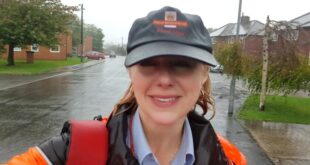Vaccines against Covid-19 could still be effective despite a new study suggesting antibody levels fall “quite rapidly” after coronavirus infection, scientists leading the research have said – writes Jane Kirby, Health Editor, and Luke Powell, PA.
The new study, from Imperial College London, involved more than 365,000 randomly selected adults who tested themselves at home using a finger prick test to check if they had antibodies against Covid-19.
Over this period, the proportion of people who tested positive for Covid-19 antibodies declined by 26.5%, suggesting antibodies reduce in the weeks or months after a person is infected.
Experts leading the Real-Time Assessment of Community Transmission (React-2) study said the findings suggested immunity was “waning quite rapidly”, which could lead to an increased risk of reinfection.
However, Professor Wendy Barclay from Imperial, who worked on the study, said there was still reason to be optimistic about a vaccine being able to stimulate longer-lasting protection.
She told Times Radio on Tuesday: “I think that we can still continue to be optimistic about vaccines because vaccines will work in a different way.
“What we’re measuring at the moment is the way that our bodies’ immune response reacts to the virus infecting us.
“But when we immunise with vaccines, particularly the new generation of vaccines that have been developed and put forward into trials for Sars-CoV-2, the virus that causes Covid, they work in quite different ways and they might make an immune response which is much more long lasting than natural infection.
“So we have to keep optimistic about that.”
Professor Paul Elliott, director of the React programme and also from Imperial, told BBC Radio 4’s Today programme that a vaccine response “may behave differently to the response to natural infection”.
Asked what the implications were for a vaccine and how long protection from a vaccine may last, he said: “I think that’s an open question that needs to be kept under close research and close scrutiny over the coming weeks and months.
“It’s possible that people might need booster vaccines.
“For some viruses there’s lifelong immunity, for the coronaviruses that doesn’t seem to be the case and we know that you know that that the immunity can fluctuate so, yes, this is something that needs to be looked at very carefully.”
He said healthcare workers were found to have higher levels of antibodies in the study, as did people living in large households and those from black, Asian and minority ethnic backgrounds.
Professor Graham Cooke from Imperial, who also worked on the study, said: “The big picture is after the first wave, the great majority of the country didn’t have evidence of protective immunity.
“The need for a vaccine is still very large, the data doesn’t change that.”
Eleanor Riley, professor of immunology and infectious disease at the University of Edinburgh, said the study suggested that home antibody testing kits were not useful for people trying to assess their own previous exposure.
She added: “These data should not be taken to infer that a vaccine would only induce short-term immunity.
“Vaccines contain immune stimulators (adjuvants) that induce durable immune responses and the administration of multiple doses of vaccine ensures that high concentrations of antibodies (that decline only slowly over time) are achieved in the majority of vaccine recipients.”
Dr Alexander Edwards, associate professor in biomedical technology at the University of Reading, said the rapid home tests used in the study are generally only “able to detect only high levels of antibody”.
He said other lab-based tests can detect really low levels of antibodies, adding: “When people are ill, antibody levels rise, and when you heal, antibody levels do drop naturally – this is not exactly the same as losing immunity.
“What is not clear is how quickly antibody levels would rise again if a person encounters the Sars-CoV-2 virus a second time.
“It is possible they will still rapidly respond, and either have a milder illness, or remain protected through immune memory.
“So even if the rapid antibody test is no longer positive, the person may still be protected from re-infection.
“But we don’t know this yet, it takes time to work this out, by following large groups over many months, and this type of study is ongoing yet hard and slow.”
The React study found that people aged 18 to 24 had the highest prevalence of antibodies and lowest decline in antibody levels, at 14.9%.
Meanwhile, people aged 75 and over had the lowest prevalence and saw the largest drop, with antibody levels falling by 39%.
Asked about herd immunity, Helen Ward, professor of public health at Imperial College London, said: “Even at best, (in the first round of the study) 94% of the population remained not likely protected, and now that has declined to over 95% of the population who don’t have evidence of antibodies.
“So I think we are a long, long way from any idea that the population will be protected by other people.”
She added that immunity in England was “waning quite rapidly”.
The team said that, even if a person tests positive for antibodies, they still need to follow national guidelines including social distancing and wearing face coverings.
Source link

